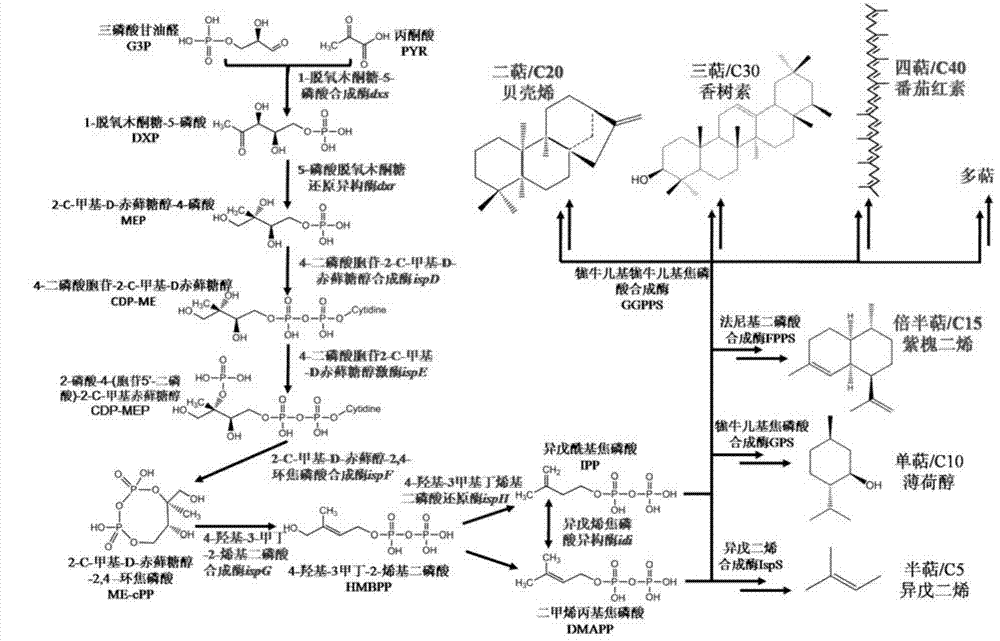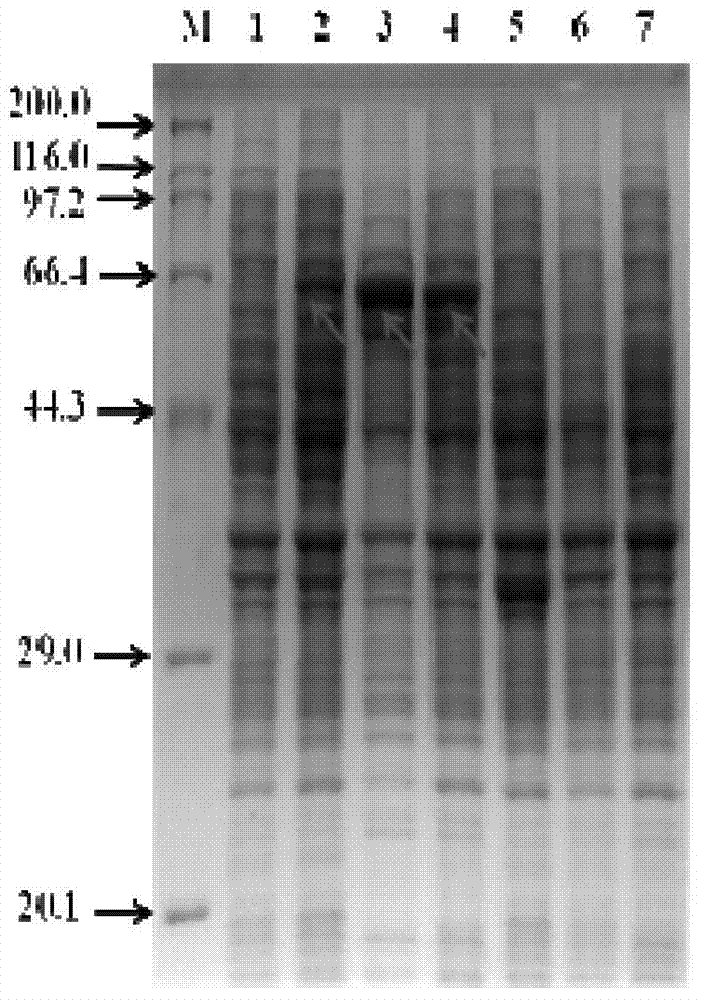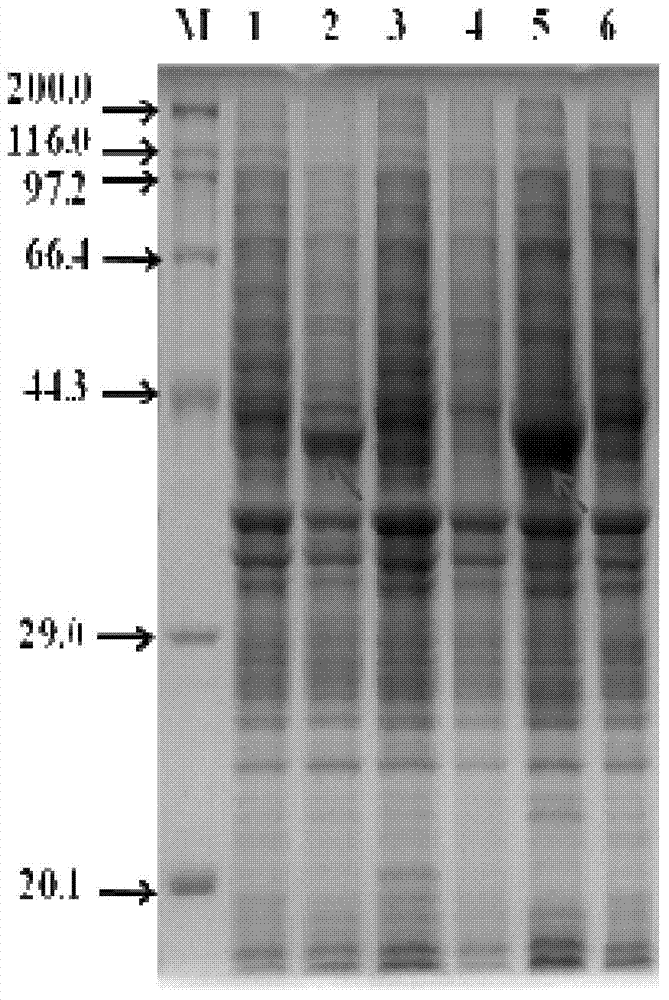Recomposed escherichia coli base cell for efficient synthesis of terpene chemical compounds as well as preparation method and application thereof
A terpenoid, Escherichia coli technology, applied in the field of recombinant Escherichia coli chassis cells, can solve the problem that the metabolic flux of the MEP pathway cannot be fully opened to produce terpenoid chassis cells, without synthetic biology and industrial microorganism technology, chassis cells cannot meet the requirements. Issues such as requirements for large-scale production of terpenoids
- Summary
- Abstract
- Description
- Claims
- Application Information
AI Technical Summary
Problems solved by technology
Method used
Image
Examples
Embodiment approach
[0125] As an embodiment of the present invention, the gene sequence of the present invention can be constructed by PCR.
[0126] Vectors and host cells
[0127] The present invention also provides a vector or a vector mixture, which contains the gene combination described in the present invention, and preferably also contains an expression control sequence operably linked to the gene sequence.
[0128] The term "operably linked" or "operably linked to" refers to the condition that certain parts of a linear DNA sequence can regulate or control the activity of other parts of the same linear DNA sequence. For example, a promoter is operably linked to a coding sequence if it controls the transcription of the sequence. Those skilled in the art can select a suitable expression vector according to the host cell. According to the cleavage map of the known empty expression vector, those skilled in the art can insert the gene sequence of the present invention into an appropriate restr...
Embodiment 1
[0146] Cloning of MEP pathway genes from different strains
[0147] Table 1
[0148]
[0149] In this embodiment, Table 1 is used as an example, and the above-mentioned genes are selected for cloning.
[0150] dxs, dxr, ispD, ispF, idi genes of Escherichia coli, dxs1, dxs2, dxr, ispD, ispF, idi genes of Streptomyces avermitilis, dxs, dxr, ispD, ispF, idi1, idi2 gene, Bacillus subtilis dxs, dxr, ispD, ispF, idi gene, Erwinia (Erwinia taxi ATCC55669, referred to as ATCC) dxs, dxr, ispD gene, and Staphylococcus aureus idi gene design primers, primers Designs were designed and synthesized using conventional methods.
[0151] Genomic DNA of Streptomyces avermitilis, Saccharopolyspora erythromycin, Bacillus subtilis, Erwinia ATCC and Staphylococcus aureus were extracted using a genome extraction kit (Axygen Company). Using the corresponding genomic DNA as a template, the above 26 genes were amplified by PCR.
[0152] The PCR product was purified using a conventional Axygen DN...
Embodiment 2
[0158] Expression of each gene module
[0159] Each plasmid containing each module gene was transformed into commercially available Escherichia coli BL21(DE3), and then a single colony was picked and cultured overnight. Inoculate 1% inoculum into a test tube containing 2ml LB medium (100ml / L ampicillin), incubate at 37°C for 2h, add 0.1mM IPTG, place at 28°C, 200rpm for 6h induction. The bacteria in the culture medium were collected and ddH 2 After O suspension, prepare samples for SDS-PAGE followed by protein electrophoresis.
[0160] expression results see Figure 2-Figure 6 . Figure 2-Figure 6 The expression results of dxs module, dxr module gene, ispD module gene, ispF module gene and idi module gene from different species of MEP precursor pathway, dxs2AV, dxs1AV, dxs SE, dxr SE, dxr ATCC, dxr BS and ispD SE, confirmed by sequencing performed by Shanghai Boshang Biotechnology Co., Ltd.
PUM
 Login to View More
Login to View More Abstract
Description
Claims
Application Information
 Login to View More
Login to View More - R&D
- Intellectual Property
- Life Sciences
- Materials
- Tech Scout
- Unparalleled Data Quality
- Higher Quality Content
- 60% Fewer Hallucinations
Browse by: Latest US Patents, China's latest patents, Technical Efficacy Thesaurus, Application Domain, Technology Topic, Popular Technical Reports.
© 2025 PatSnap. All rights reserved.Legal|Privacy policy|Modern Slavery Act Transparency Statement|Sitemap|About US| Contact US: help@patsnap.com



